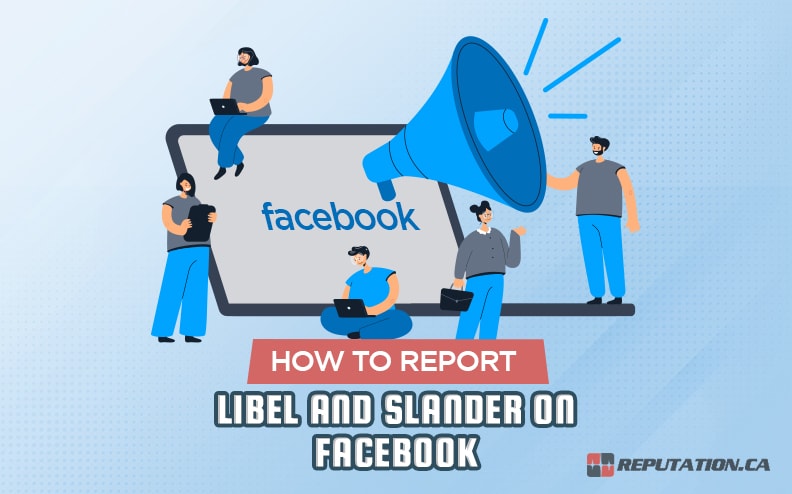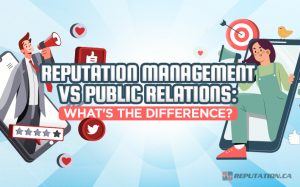Facebook is the world’s most-used social media network, and that means it has all the highs and lows of human society encased in its digital walls. For every fun interaction, witty joke, humorous meme, or pleasant conversation with a friend, there’s the risk of someone posting something insulting about you in a public space.
If you’re a business owner, a high-profile public figure, or even just an individual, you’re probably concerned about the things people say about you online. While some things can be shrugged off like a “yo momma” joke, others can be highly damaging, even to the point of costing you your job, a job prospect, a relationship, or more.
It’s no surprise, then, that you might want to take action against this kind of content. The question is, how can you do it?
Can You Report Defamation on Facebook?
First of all, it’s worth asking the question: can you even report defamation on Facebook? After all, they’re a massive corporation with a reputation for making it difficult or impossible to contact their over-stressed, over-worked, underpaid support staff.
Luckily, in this case, the answer is yes.
Facebook’s defamation process is fairly robust and with good reason: actual defamation of character can be a serious legal matter, and they don’t want to get caught up in it.
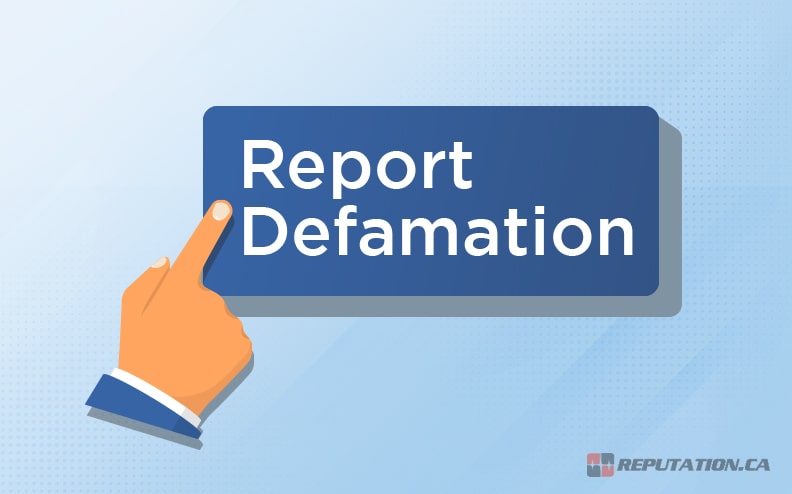
The trouble is, a lot of what people report as “defamation” isn’t really defamation of character at all. Defamation has to meet specific legal criteria. It’s like wine; it has to come from the Defamation region of legal code; otherwise, it’s just sparkling insults.
With that in mind, and with the fact that Facebook social media platform has billions of users, many of whom will happily hammer the reporting system until they get their way, Facebook’s front line of defense is algorithmic sorting. So, your defamation report has to get past the robots first before a real human can look at it and make a determination.
Let’s dig into the process, talk about what options you have available to you, and when you should consider a stronger legal action.
What Constitutes Reportable Defamation?
Defamation, made up of slander and libel, is a semi-complicated legal definition for a specific kind of speech that is not protected under various laws and rights to free speech around the world. While laws and the exact definition can vary slightly between the U.S., Canada, and other regions, it’s generally similar.
- Defamation: A statement made against you or your business that is false, makes a tangible claim, and causes actual harm.
- Slander: Defamation that takes the form of an intangible statement, like something spoken aloud during a public address. Technically, video and live-streamed content is slander.
- Libel: Defamation that takes the form of a tangible statement, like a post on a social network.
Facebook content can be both slander and libel; for example, libel on Facebook is for text posts and slander for video content. Either way, the method for handling them is the same.
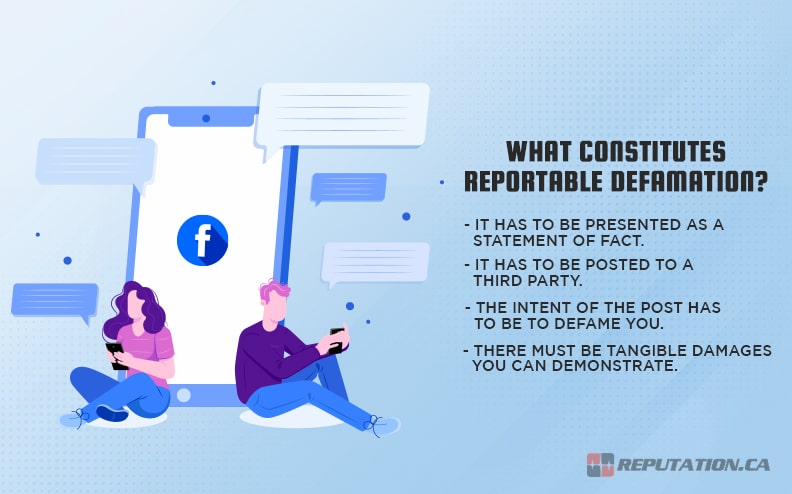
In order for a false statement to be considered defamation (rather than just insulting or vulgar statements), it needs to meet four criteria.
- It has to be presented as a statement of fact. This requires context, more so than specific phrasing.
- It has to be posted to a third party. A post on Facebook can be defamatory; a direct message to you cannot.
- The intent of the post has to be to defame you, damage your reputation, and disregard evidence to do it.
- There must be tangible damages you can demonstrate.
Note that these are the requirements for a legal suit; you have to prove each of them in order to successfully win a lawsuit against the poster. The standards are generally lower for getting a post removed from Facebook via their reporting system.
You can read more about the definitions, differences, and requirements in our complete guide here.
How to Handle the Process of Reporting Defamation on Facebook
The actual process for users handling defamation on Facebook is a little more complicated than clicking the “report” button and filling it out.
Step 0: Lay the Groundwork
If you’re planning to report content for defamation, or if you’re planning to do something stronger, like filing a defamation lawsuit, you need to take steps ahead of time.
Stay calm. Getting angry makes you make bad decisions, and acting rashly can do more harm than good, both to your case and to your reputation.
Don’t reply, message, or engage with the person posting these materials. Doing so has a range of detrimental effects, including:
- Risking them blocking you so you can’t see further defamatory content.
- Making you look worse via your replies and/or validating their claims through your behavior.
- Amplifying their message to people who can see your comments but wouldn’t otherwise see theirs.
Responding to the defamatory or acknowledging the content in defamatory post in any way is liable to leave you in a worse position.

Preserve the evidence. If you call out or file suit against the defamer, they might remove the content. If no evidence exists, it can be difficult to prove the posts existed without substantial work. Taking screenshots or video can be an important part of the process. You may need to use a third-party utility to download videos if necessary.
Increase your privacy settings. Facebook gives you a lot of control over who can see what you post. Increasing this privacy can help insulate you against people who would use the defamatory statements to attack you or against people who would use social media platforms to “research” you. Unfortunately, it doesn’t really directly help in a defamation situation, but it’s also not a bad idea to do in general. Sadly, if you’re a business or public figure, you don’t have many options.
Be cautious with other advice. Some people will urge you to block the people defaming you. Sometimes, this is a good idea; if a person is posting defamatory content on your wall, blocking them can prevent them from doing so. On the other hand, this comes with risks. Blocking the user means you can’t see future content they post, but that doesn’t mean no one else can. If blocking them helps you maintain self-control, do so. If not, keeping them visible so you can see what other evidence they post for themselves may be the better option.
Step 1: Determine what you’re reporting.
You need to determine two things. First, you need to make a list of the content you’re reporting. This can be videos, text posts, comments, images, and anything else someone posts about you, on your wall or on theirs, in a public or private group; anywhere you can access it.
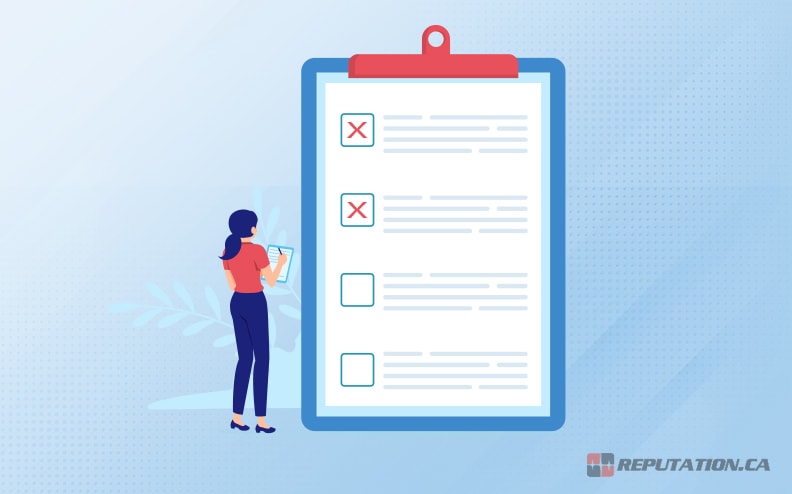
Second, you need to determine why you’re reporting it. Luckily, a defamation suit really isn’t the only option here.
- Defamation is obvious; if you believe the statements are actually defamatory, you can use the defamation reporting tool.
- Violation of Facebook community rules. If a post or piece of content is abusive or harmful to you but is not technically or legally defamatory, you can still report it as a violation of bullying, harassment, or other rules.
Once you have made this determination, you can decide what steps to take next.
Step 2: Report the Content
Once you’ve determined which kind of reporting you need to do, it’s time to do so.
To report specific content, you need to navigate to that content on Facebook. Find the person, post or video responsible. There will be a menu button to click, with “report this content” as the final option. When you click this button, you will see a variety of options, including nudity, violence, harassment, false information, spam, hate speech, terrorism, and more.
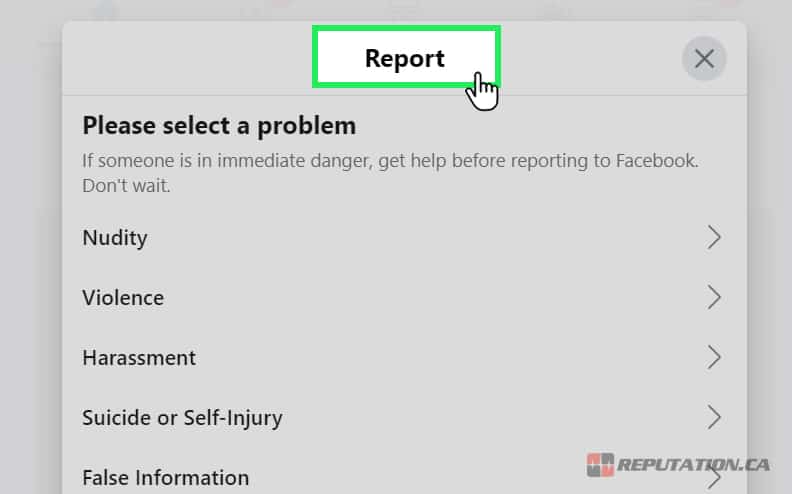
If you believe that the content posted is not actually a defamatory statement or would not hold up in court, but it can constitute harassment, bullying, or other kinds of social assault, reporting the content via the Harassment, False Information, or Something Else > Bullying options can be the way to go.
- Harassment requires that the person be aggressively posting at you, degrading or shaming you, calling for self-injury, using derogatory terms, and so on.
- False information requires the information to be false (obviously) and has you pick a category and verify that the content violates Facebook policies and community standards.
- Bullying has the lowest standards but the lowest penalties.
It’s also worth mentioning that Facebook gives more protection to minors and to private citizens than to public figures or businesses. It’s difficult to use the reporting system to remove critical business reviews that aren’t defamatory statements, for example.
On the other hand, if you believe the content is defamatory, you can instead use Facebook’s Defamation Reporting Form. To use this form, you must first select the country you’re in. If you’re in Canada, you can then click an option for who you’re reporting for (yourself, your business, someone else) and fill out the form. The defamation reporting form includes your name, mailing address, list of offending URLs, and any additional information you would like to submit.
In the United States, you, unfortunately, do not have this option. If you select the U.S., you will see this:
“Facebook is not in a position to adjudicate the truth or falsity of statements made by third parties, and consistent with Section 230(c) of the Communications Decency Act, is not responsible for those statements. As a result, we are not liable to act on the content you want to report. If you believe content on Facebook violates our Community Standards (e.g., bullying, harassment, hate speech), please visit the Help Center to learn more about how to report it to us.”
If this is the case, you will need to instead consult with a lawyer to pursue an actual defamation claim.
Step 3: Wait and Move On
Sadly, there’s not much you can do other than wait once you’ve submitted a report. Ideally, after a few days have passed, Facebook will agree with your position and will remove the content. Unfortunately, they will often take weeks or months before “investigating” and then take no action.

At this point, you have to decide whether to take the matter to a lawyer or let it go. If you believe you can prove tangible damages to your reputation or personal life (such as having lost a job or job opportunity, or lost customers who cited the post as a reason why), you can go to a lawyer. Otherwise, it might not be possible to prove damages and thus not worth your time and energy.
What Else Can You Do?
If you’re trying to fight defamation on Facebook, your best option may be to contact a reputation management firm like us. We have experience in handling all manner of statements, from the merely vulgar and insulting to actual harassment and bullying to legal defamation. We’re also adept at using Facebook’s systems to achieve the desired outcome.
There are many different techniques available to you to handle a social media post with a reputation issue that doesn’t meet the legal definitions of defamation. On the other hand, if the social media posts are more likely to meet the legal definitions of defamation, slander, or libel, you can consult with a lawyer as well. A defamation lawsuit may not be easy to serve or process, and it may not come cheap, but it’s by far the most permanent solution.

If you’re an individual facing serious online defamation, a lawsuit is most likely the way to go. If you’re a business, it might be better to opt for reputation management, review-building, SEO, marketing, and other techniques to instead suppress and bury the negative content under a flood of positive reviews and testimonials. After all, the more attention and platform you give to negative content – including suing over it – the more of a spread it gains.
It’s important to note that every situation is unique. We can’t give you perfect advice in a blog post because we don’t have all the facts. If you want an expert eye to take a look at your situation and offer advice, feel free to contact us today. We know you’re in a tough situation, and we’re here to help. Additionally, if you ever have any questions regarding reputation management overall, do not hesitate to reach out and contact us as well! We would be more than happy to assist you in answering your reputation management questions however we possibly can!
FAQ for Libel or Slander on Facebook
How do I report libel and slander on Facebook?
A: To report libel and slander on Facebook, you can click “find support or report” on the specific post or comment that contains the defamatory content. You can also fill out the defamation reporting form provided by Facebook.
Can I sue for defamation on Facebook?
A: Yes, if you have been a victim of social media defamation on Facebook, you can sue for defamation. It’s advisable to seek legal advice from a law firm specializing in social media defamation cases like Minc Law to understand your options and the steps you can take.
What are the elements of defamation of character on Facebook?
A: To prove defamation of character on Facebook, you must show that there was a false and defamatory statement made about you, it was published to a third party, and it resulted in harm to your reputation or caused you some form of damage.
How can I deal with social media slander on Facebook?
A: Dealing with social media slander on Facebook involves taking proactive steps such as reporting the defamatory content to Facebook, seeking legal counsel to understand your options, and potentially taking legal action against the perpetrator of the slanderous content.
What steps can I take if I am a victim of online defamation on Facebook?
A: If you are a victim of online defamation on Facebook, you can begin by documenting the defamatory content, reporting it to Facebook, seeking legal advice from a defamation law firm, and considering legal action to protect your rights and seek damages for the harm caused.
Can a Facebook post or comment be considered libel or slander?
A: Yes, a Facebook post or comment can be considered an act of libel or slander if it contains false and defamatory statements about an individual or entity, which can harm their reputation or cause them damage in some way.
What are the defenses to a defamation lawsuit related to Facebook posts?
A: Defenses to a defamation lawsuit related to Facebook posts may include truth as a defense (if the statement is true), opinion or fair comment, and the absence of actual malice if the plaintiff is a public figure. It’s important to seek legal advice to understand the specific defenses applicable to your case.
If someone has defamed me on Facebook, can I sue them for personal injury?
A: Yes, if someone has defamed you on Facebook and it has caused you harm, you may be able to sue for personal injury. Consulting with a law firm with experienced attorneys who in social media defamation cases can help you understand the legal options available to you.
What are the types of defamation that can occur on Facebook?
A: The types of defamation that can occur on Facebook include libel (written defamation) through posts or comments, and slander (spoken defamation) through audio or video content shared on the social media platform.
How does the First Amendment affect defamation cases related to Facebook posts?
A: The First Amendment may provide protection for free speech, but it does not shield individuals from liability for making false and defamatory statements. When it comes to defamation cases related to Facebook posts, the First Amendment rights must be balanced with the legal rights of the plaintiff who has been defamed.




